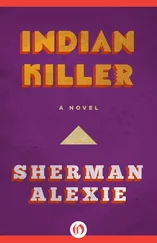I stare at his face in the mirror.
“Why did you leave me?” I ask.
He doesn’t answer.
“Why do you have a photograph of me when I was five? Did my mother send it to you? Why did you want to carry a photograph of me but not me ?”
I can feel him fighting me. He doesn’t want to remember the day he left me.
But I am younger and stronger. I am better. I will make him remember. I will force him to remember. I will kill him if I have to.
And so I push against my father’s mind and soul. I crash through his fortifications and rampage into his memory and tear through his homes, wells, and streets, until I see it: the hospital where I was born. Or, rather, the memory of that hospital. And I burst inside and race up the stairs, and back through the years, and rush through a door into the maternity ward hallway where my father paces.
Somewhere on this floor, my mother is giving birth to me. But my father is not in that room. No, he’s outside, removed, remote.
“Sir?” a nurse asks him. “Can I help you?”
“My wife is giving birth,” he says.
“Do you know where?”
“Yes, room eight-twelve.”
The nurse is confused. Why is he standing here while his wife is giving birth? Men don’t wait outside anymore. Men aren’t allowed to wait outside anymore. Or maybe there are problems. Maybe it’s a difficult birth. Maybe this poor man needs compassion.
“Sir,” the nurse says, “your wife and child are going to be okay. We have the finest—”
He puts his hand over her mouth. She doesn’t stop him. She’s too surprised. Confused. No father has ever touched her face like that. Has violated her boundaries like that. Expectant and fearful fathers have grabbed her. Even pushed or pulled her. But nobody has ever tried to silence her. He realizes his error. He pulls his hand away.
“I’m sorry, I’m sorry,” he says. “It’s just — I can’t stand words right now. I can’t stand to hear anybody say anything. Please, just go. Just go and leave me alone.”
She quickly walks away, wonders briefly if she should call security, but then realizes that the man has enough problems. She knows he’s just a weak man ashamed of his weakness.
She prays for him. Dear God, she thinks, help this man become a better man than he is now.
My father doesn’t feel her prayers.
He only feels a sharp pain in his chest. Something has broken. He knows he is sick and damaged. But what has made him sick? And what has damaged him?
My father remembers being eight years old, lying in bed while a man stands in the dark doorway. Who is that man?
It is my father’s father.
“I know you’re awake,” my grandfather says. He is drunk, slurs his words, and wavers in the doorway.
My father doesn’t move. He believes that his father will go away if he doesn’t move. It’s a magic spell that gets repeated every Friday and Saturday night.
“Your momma said you went out shooting today,” Grandfather says.
When my father hunts, he imagines the animals, the targets, are his father.
“Did you bring down anything?” Grandfather asks.
My father imagines pressing the rifle barrel against my grandfather’s temple. Imagines pulling the trigger.
“Did you kill anything? Any meat?” Grandfather asks.
That day, my father shot at and missed three quail and one deer.
“I asked you if you got any meat,” Grandfather says.
My father doesn’t want to tell the truth. The truth will get him hurt. A lie will also get him hurt. He’s going to get hurt no matter what he does.
“If you don’t answer my question, boy, I’m gonna get mad.”
Silence.
“I’m gonna ask you one more time,” Grandfather says. “Did you shoot anything today?”
“No,” my father says.
“Jesus,” Grandfather says. “What good are you? What kind of man are you? Ain’t I taught you how to shoot? And you waste my time and my bullets and my energy. You’re just a pussy boy. I can’t believe you are part of me. I wish you’d just go away.”
And then my grandfather leaves my father alone in the dark.
My father wants to weep. He wants to cry out for his father. He wants to be forgiven, to be loved. But if he speaks he will only be ridiculed again. He will only be diminished.
And then my grandfather walks back into the room. He stands over my father.
“I want you to know what I know,” my grandfather says. “You ain’t worth shit now. And you ain’t ever gonna be worth shit.”
My father stares at a stain on the ceiling. He has memorized the shape of that stain.
“Say it,” my grandfather says.
“Say what?” my father asks.
“Say you ain’t worth shit.”
My father wants to resist, to rebel, but he knows the punishment will end only if he submits.
“I ain’t worth shit,” my father says.
“Say it again.”
“I ain’t worth shit.”
“Louder.”
“I ain’t worth shit!” my father screams.
“Louder.”
“I ain’t worth shit!” my father screams. “I ain’t worth shit! I ain’t worth shit! I ain’t worth shit! I ain’t worth shit!”
My father screams long after my grandfather has left the room.
And now my father, whipped and bloodied by his memory, stops pacing in the hospital hallway. Somewhere on this floor, my mother is giving birth to me. But my father cannot be a participant. He cannot be a witness. He cannot be a father.
And so he runs. And as he runs, he closes his eyes. And as he closes his eyes, I close my eyes.
WHEN I OPEN MY eyes, I’m standing in a bank in downtown Seattle.
Yes, that bank.
I have two pistols in my coat, a paint gun and a.38 special.
Yes, those guns.
I’m supposed to pull them out and shoot everybody I see.
Yes, I’m supposed to kill for Justice.
I did it before: a long time ago, a little while ago, a second ago. I don’t understand how time works anymore.
There’s that man again, the one who told me I wasn’t real.
I think he’s wrong; I think I am real.
I have returned to my body. And my ugly face. And my anger. And my loneliness.
And then I think, Maybe I never left my body at all. Maybe I never left this bank. Maybe I’ve been standing here for hours, minutes, seconds, trying to decide what I should do.
Do I pull out my guns and shoot all these people?
Do I shoot that little boy over there with his mother? He is maybe five years old. He has blue eyes and blond hair. He’s wearing good shoes. A jean jacket. Khaki pants. Blue shirt. He’s beautiful. A beautiful little man. His mother, also blond and blue-eyed, smiles down at him. She loves him. She sees me watching them and she smiles at me. For me. She wants me to know how much she loves her son. She’s proud of the little guy.
Did my mother love me like that? I hope so.
I wave at the little boy. He waves back.
I hate him for being loved so well.
I want to be him.
I close my eyes and try to step inside his body. But it doesn’t work. I cannot be him.
I open my eyes. I think all the people in this bank are better than I am. They have better lives than I do. Or maybe they don’t. Maybe we’re all lonely. Maybe some of them also hurtle through time and see war, war, war. Maybe we’re all in this together.
I turn around and walk out of the bank. I step out onto First Avenue.
It’s not really raining, but this is Seattle. There are only fifty-eight sunny days a year in our city. So it always feels like it’s just about to rain, even when the sun is out.
I used to hate the rain. But now I want it to pour. I want it to storm. I want to be clean.
I am surrounded by people who trust me to be a respectful stranger. Am I trustworthy? Are any of us trustworthy? I hope so.
Читать дальше












